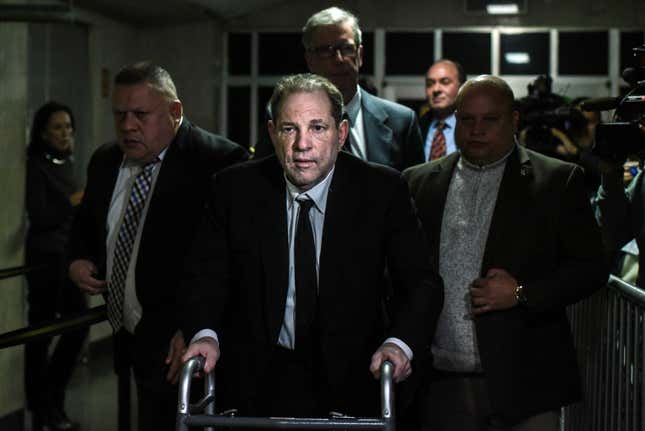Harvey Weinstein Is Not a Husband Who Strayed
Latest

Ahead of the launch of the criminal trial against Harvey Weinstein, the infamous Hollywood producer released a statement that tells us much of what we need to know about his upcoming defense. Weinstein, who now faces five counts of rape and sexual assault, claimed that the “past two years” since the launch of the contemporary MeToo movement have been a “great opportunity for self-reflection.” Unsurprisingly, this self-reflection seems only to have inspired an angle for discrediting the more than 80 women who have brought accusations against him. “I realize now that I was consumed with my work, my company and my drive for success,” he wrote in an email to CNN. “This caused me to neglect my family, my relationships and to lash out at the people around me.” Weinstein added that he has been in rehab and joined a 12-step program.
It is the bad husband defense. It is boys will be boys.
Here we have a preview of what the next several weeks will hold during Weinstein’s New York trial—as well as, potentially, his team’s response to new criminal charges filed in Los Angeles. This seems a sneak peak of the narrative the defense will creatively spin: It is the bad husband defense. It is boys will be boys. It is the collision of age-old sexist notions of men’s uncontainable sexuality with fantasies of power, access, and excess.
When CNN spoke with Weinstein’s criminal defense attorney, Donna Rotunno, she echoed her client, saying that he would be “the first one to say he did bad things.” She continued, “He cheated on his wife, he was dishonest about that, he had multiple women he slept with at different points and he would say that those were bad choices,” said Rotunno. “He’s lost everything for those bad choices. Nobody is trying to claim that he is a saint and that he never did anything wrong.” However, she added, “I don’t believe Harvey is a rapist.”
In addition to attempting to brutally undermine Weinstein’s accusers, his legal team is poised to invoke the familiar image of the broken, regretful philanderer. Indeed, his wife of nearly a decade has divorced him. It’s so often women, even in absentia, who are trotted out to humanize accused men.
-

-

-

-

-

-

-

-

-

-

-

-

-

-

-

-

-

-

-

-

-

-

-

-

-

-

-

-

-

-

-

-

-

-

-

-

-

-

-

-








































